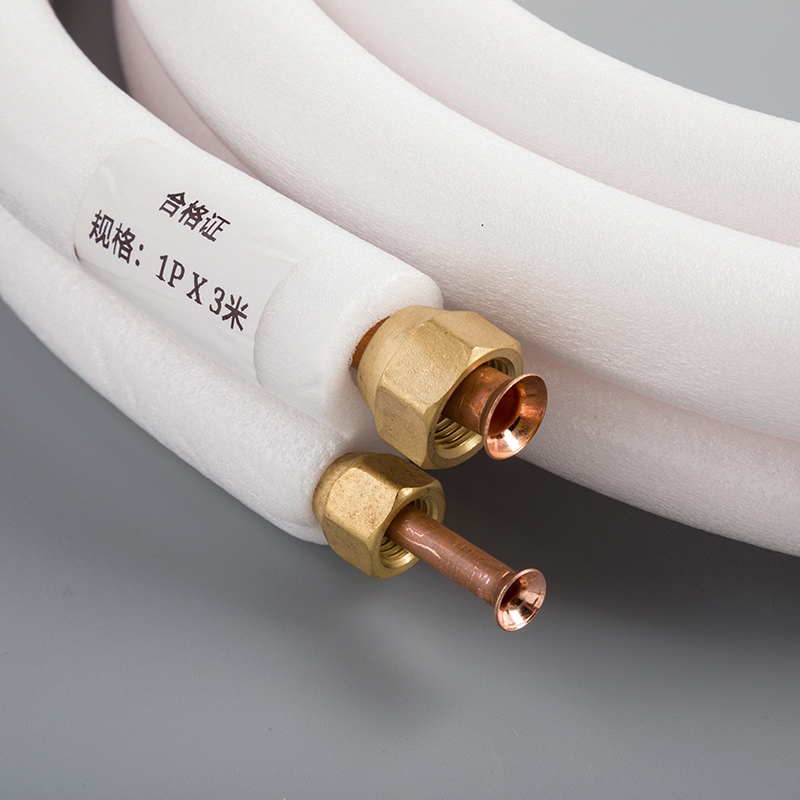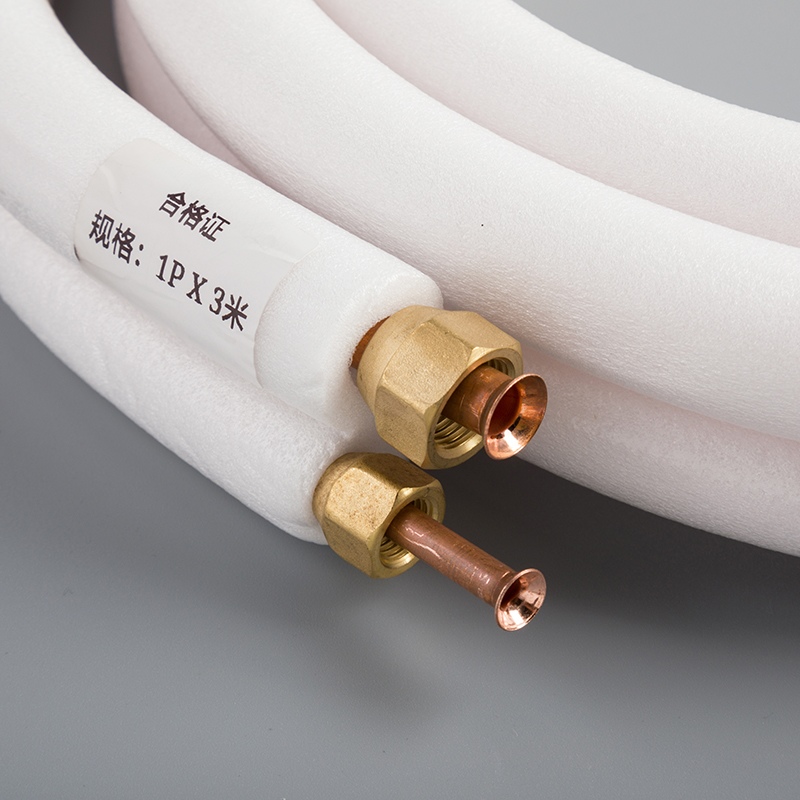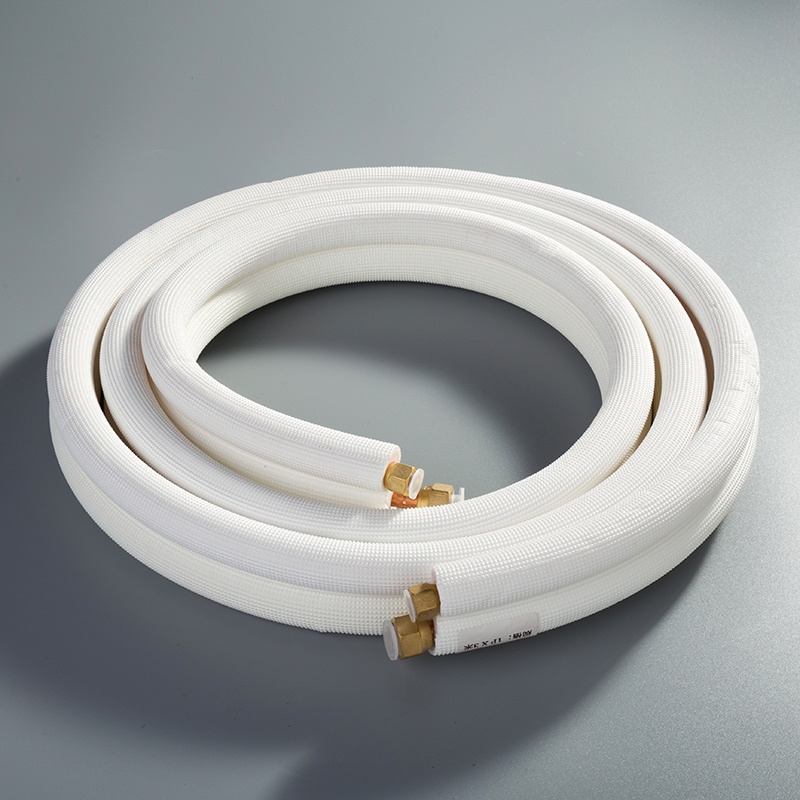Why Copper AC Pipes Are Vital for Cooling Systems

Copper pipes play a crucial role in air conditioning systems, ensuring efficient cooling and reliable operation. Their unique properties make them superior to other materials commonly used in HVAC systems.
Durability: Copper resists corrosion and rust, which is essential for the longevity of HVAC systems.
Thermal Conductivity: Copper transfers heat efficiently, enhancing the cooling performance of aircon systems.
Flexibility: Copper can be shaped easily, simplifying installation in various setups.
Anti-Microbial Properties: Copper prevents bacteria formation, keeping your aircon cleaner and healthier.
These qualities ensure optimal performance, reduce maintenance needs, and justify the copper AC pipe cost as a long-term investment. Whether for residential or commercial air conditioning, copper remains the preferred choice for aircon pipes.
Key Takeaways
Copper pipes are strong and do not rust, lasting a long time in AC systems.
Copper moves heat well, making cooling better and lowering energy bills.
Using copper pipes means fewer repairs, saving time and money over the years.
Copper is good for the environment because it can be recycled and helps save energy.
Copper pipes may cost more at first, but they save money in the long run for AC systems.
Key Benefits of Copper Pipes

Thermal Conductivity
How copper ensures efficient heat transfer in cooling systems.
Copper stands out as a material with exceptional thermal conductivity, making it ideal for air conditioning systems. Its thermal conductivity measures approximately 401 W/m·K, which is nearly double that of aluminum at 205 W/m·K. This means copper transfers heat more efficiently, ensuring your cooling system operates at peak performance. By using copper pipes, you can achieve faster heat dissipation, which directly enhances the cooling process. This efficiency not only improves the system's overall functionality but also helps maintain a comfortable indoor environment.
The role of thermal conductivity in maintaining optimal performance.
The superior heat transfer properties of copper play a critical role in maintaining high-quality performance in HVAC systems. Efficient heat transfer reduces the workload on your air conditioning unit, minimizing energy consumption and extending the system's lifespan. With copper's unmatched conductivity, your aircon pipes ensure consistent cooling, even during peak summer months.
Corrosion Resistance
Copper's natural resistance to rust and environmental damage.
Copper pipes are naturally corrosion resistant, which makes them a reliable choice for air conditioning systems. Unlike other materials, copper does not rust when exposed to moisture or varying temperatures. This resistance ensures that your aircon pipes remain intact and functional for years, even in challenging environments.
Why corrosion resistance is critical for aircon pipes.
Corrosion resistance is essential for maintaining the durability and efficiency of air conditioning systems. When pipes corrode, they weaken and may develop leaks, leading to costly repairs. Copper's ability to resist corrosion protects your HVAC system from such issues, ensuring uninterrupted cooling and reducing maintenance needs.
Durability
Copper's ability to withstand high pressures and extreme temperatures.
Copper pipes are known for their durability, as they can handle high pressures from refrigerants and extreme temperature fluctuations. This strength ensures that your air conditioning system operates smoothly without the risk of pipe failure. Copper's tensile strength also allows it to endure the demands of modern HVAC systems.
How durability reduces the risk of leaks and system failures.
Durability is a key factor in preventing leaks and system breakdowns. Copper pipes require fewer repairs due to their robust nature, which minimizes disruptions to your cooling system. Their ability to bend without breaking makes them versatile for installation, while their corrosion resistance further enhances their longevity. By choosing copper, you invest in a reliable solution that reduces the risk of costly failures and ensures long-term performance.
How Copper Enhances Cooling System Efficiency
Heat Transfer
The role of copper in transferring heat from the refrigerant to the environment.
Copper plays a vital role in the heat transfer process of air conditioning systems. Its exceptional thermal conductivity, approximately 401 W/m·K, far exceeds that of materials like stainless steel, which has a conductivity of less than 20 W/m·K. This property allows copper to transfer heat rapidly and efficiently, ensuring the refrigerant releases heat to the environment effectively. By optimizing heat exchange, copper enhances the cooling process and supports the overall performance of your air conditioning system.
Copper is widely used in heat exchangers to maximize heat transfer efficiency.
It also serves as a key material in heat sinks, preventing overheating by absorbing excess heat.
Copper-based thermal interface materials improve connections between components, further boosting heat transfer.
How efficient heat transfer reduces energy consumption.
Efficient heat transfer minimizes the workload on your HVAC system. When copper pipes quickly dissipate heat, the system requires less energy to maintain the desired temperature. This reduction in energy consumption not only lowers your utility bills but also extends the lifespan of your aircon unit. With copper, you achieve both energy efficiency and reliable cooling performance.
Smooth Refrigerant Flow
Copper's smooth interior surface minimizes friction and pressure drops.
The smooth interior surface of copper pipes ensures minimal friction as the refrigerant flows through the system. This design reduces pressure drops, allowing the refrigerant to circulate more efficiently. Consistent refrigerant flow is crucial for maintaining the optimal operation of your air conditioning system.
The impact of consistent refrigerant flow on cooling performance.
When refrigerant flow remains steady, your aircon system can deliver consistent cooling across all zones. Variable refrigerant flow (VRF) systems, for example, adjust the flow to meet specific cooling needs, reducing energy wastage. This precision enhances energy efficiency and ensures your air conditioning system operates at peak performance.
Energy Efficiency
How copper contributes to lower energy bills.
Copper's superior thermal conductivity and smooth interior surface work together to improve energy efficiency. By facilitating efficient heat transfer and consistent refrigerant flow, copper reduces the energy required to cool your space. This translates to noticeable savings on your energy bills over time.
The long-term financial benefits of using copper AC pipes.
Investing in copper aircon pipes offers significant long-term financial benefits. Copper's durability and resistance to corrosion mean fewer maintenance issues and lower repair costs. Additionally, small-diameter copper tubes in HVAC systems reduce material costs and system size while operating at higher pressures. These advantages make copper a cost-effective and sustainable choice for your air conditioning needs.
Comparing Copper to Alternative Materials

Copper vs. Aluminum
Key differences in thermal conductivity and durability.
When comparing copper to aluminum, you’ll notice significant differences in their thermal conductivity and durability. Copper has a thermal conductivity of approximately 401 W/m·K, nearly double that of aluminum, which measures around 205 W/m·K. This makes copper far more efficient at transferring heat, a critical factor in air conditioning systems. With copper pipes, your cooling system can dissipate heat faster, ensuring optimal performance.
Durability is another area where copper outshines aluminum. Copper pipes resist corrosion naturally, even in environments with fluctuating temperatures and moisture. They also maintain their strength under high pressures and extreme conditions. If cracks occur, copper can be easily soldered, making repairs straightforward. Aluminum, on the other hand, weakens at high temperatures and corrodes more quickly, leading to frequent maintenance issues.
Why aluminum is less reliable for long-term use in air conditioning systems.
Aluminum’s lower durability and susceptibility to corrosion make it less reliable for long-term use in air conditioning systems. Over time, aluminum pipes may develop leaks or fail under pressure, compromising the efficiency of your HVAC system. Copper’s superior strength and resistance to environmental damage ensure that your aircon pipes remain functional for decades, reducing the risk of costly repairs.
Copper AC Pipe Cost vs. Performance
The initial cost of copper compared to its long-term value.
Copper pipes may have a higher upfront cost compared to aluminum, but their long-term value justifies the investment. Their durability and resistance to wear mean fewer replacements and repairs over time. Additionally, copper’s exceptional thermal conductivity enhances the efficiency of your air conditioning system, lowering energy consumption and reducing utility bills.
Why investing in copper is more cost-effective over time.
Choosing copper for your aircon pipes saves you money in the long run. Its ability to withstand high pressures and resist corrosion minimizes maintenance costs. Furthermore, copper’s compatibility with modern refrigerants ensures that your HVAC system operates efficiently, extending its lifespan and delivering consistent cooling performance.
Environmental Impact
Copper's recyclability and sustainability advantages.
Copper offers several sustainability benefits that make it an eco-friendly choice for air conditioning systems:
It can be recycled infinitely without losing quality.
Recycling copper uses only 15% of the energy required for mining and processing new copper.
About 75% of all copper ever mined is still in use today, highlighting its reusability.
Recycling copper reduces waste and supports a circular economy.
How copper supports eco-friendly cooling solutions.
Copper contributes to sustainable cooling solutions in multiple ways. Its high thermal conductivity improves energy efficiency, reducing the environmental impact of HVAC systems. Copper’s corrosion resistance ensures long-lasting performance, cutting down on waste from frequent replacements. Additionally, copper works seamlessly with low global warming potential refrigerants, making it a key material for eco-friendly air conditioning systems.
Maintenance and Longevity of Copper Pipes
Low Maintenance
How copper's properties reduce the need for frequent repairs.
Copper's natural properties significantly reduce the need for frequent repairs in air conditioning systems. Its corrosion resistance ensures that the pipes remain intact even in environments with high moisture or temperature fluctuations. Proper installation techniques, such as selecting the correct pipe size and ensuring the right slope, prevent water stagnation, which could otherwise lead to corrosion. Additionally, using corrosion inhibitors forms a protective layer on the copper surface, further minimizing the risk of damage. Regular maintenance, like annual inspections and running water through fixtures, helps detect potential issues early, ensuring your aircon pipes stay in excellent condition.
The role of corrosion resistance in minimizing maintenance.
Corrosion resistance plays a vital role in reducing maintenance needs. Unlike other materials, copper does not rust or degrade easily, even when exposed to refrigerants or environmental factors. This durability prevents common issues with aircon pipes, such as leaks or blockages, which often require costly repairs. By choosing copper, you benefit from a material that naturally withstands wear and tear, ensuring long-term performance with minimal upkeep.
Long Lifespan
Copper's ability to withstand wear and tear over decades.
Copper pipes are renowned for their longevity. They can last over 50 years, even in demanding HVAC systems. This durability stems from copper's ability to resist corrosion, handle high pressures, and endure extreme temperatures. Compared to other materials, such as galvanized steel or PVC, copper consistently outperforms in terms of reliability and lifespan.
Material | Average Lifespan (Years) |
|---|---|
Copper | Over 50 |
Galvanized Steel | 20 to 50 |
PVC/CPVC | 50 to 100 |
Why copper is a reliable choice for long-term cooling system performance.
Copper's strength and resistance to common issues with aircon pipes make it a dependable choice for long-term performance. Its ability to handle refrigerants without degrading ensures consistent cooling over decades. This reliability reduces the risk of unexpected failures, saving you time and money on replacements.
Preventing Issues
How copper reduces the risk of leaks and blockages.
Copper's smooth interior surface minimizes friction, allowing refrigerants to flow freely. This design reduces the likelihood of blockages, which can disrupt your air conditioning system. Additionally, copper's resistance to corrosion prevents the formation of weak spots that could lead to leaks. By using copper, you address two of the most common issues with aircon pipes, ensuring a more efficient and reliable system.
Tips for maintaining copper aircon pipes to maximize their lifespan.
To maximize the lifespan of your copper aircon pipes, follow these maintenance tips:
Regular Inspections: Check for signs of leaks, corrosion, or damage.
Keep Pipes Clean and Clear: Remove debris to maintain proper refrigerant flow.
Prevent Freezing: Insulate exposed pipes and drain outdoor hoses during winter.
Monitor Water Pressure: Use a gauge to keep pressure within 40-80 psi.
Address Leaks Promptly: Fix any leaks immediately to avoid further damage.
By following these steps, you can ensure your copper pipes deliver optimal performance for decades.
Copper pipes are essential for air conditioning systems due to their unmatched properties. Their superior thermal conductivity ensures efficient heat transfer, while their durability and corrosion resistance make them ideal for carrying refrigerants in both liquid and gas forms. These qualities reduce maintenance needs and extend the lifespan of HVAC systems, offering long-term reliability.
Additionally, copper supports sustainability by enhancing energy efficiency and reducing greenhouse gas emissions. While the initial cost may be higher than alternatives like PVC or PEX, copper's long-term cost-effectiveness outweighs the upfront expense. Its ability to optimize system performance and minimize repairs makes it the best choice for aircon pipes.
Choosing copper for your aircon system is an investment in efficiency, durability, and sustainability.
FAQ
What makes copper better than other materials for air conditioning systems?
Copper offers superior thermal conductivity, durability, and corrosion resistance. These qualities ensure efficient cooling, fewer maintenance issues, and a longer lifespan for your air conditioning system. Its ability to handle high pressures and extreme temperatures makes it the best choice for aircon pipes.
How does copper improve the efficiency of HVAC systems?
Copper enhances HVAC systems by transferring heat efficiently and allowing smooth refrigerant flow. Its high thermal conductivity reduces energy consumption, while its smooth interior minimizes friction. These features ensure your HVAC system operates efficiently and delivers consistent cooling performance.
Are copper aircon pipes environmentally friendly?
Yes, copper is highly recyclable and sustainable. Recycling copper uses less energy than mining new material, reducing environmental impact. Its durability also minimizes waste from frequent replacements, making it an eco-friendly choice for air conditioning and HVAC systems.
Do copper aircon pipes require frequent maintenance?
No, copper aircon pipes require minimal maintenance. Their corrosion resistance and durability reduce the need for frequent repairs. Regular inspections and proper care, like cleaning and monitoring for leaks, can help maximize their lifespan and ensure reliable performance.
Is the higher cost of copper pipes worth it?
Yes, the higher initial cost of copper pipes is worth it. Their durability, efficiency, and low maintenance needs save you money over time. Copper’s long lifespan and superior performance make it a cost-effective investment for air conditioning and HVAC systems.
See Also
The Importance Of Pure Copper Pipes In AC Efficiency
Key Advantages Of Copper Pipes For Air Conditioning Systems
Reasons To Opt For Copper Pipes In Your AC


